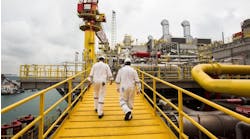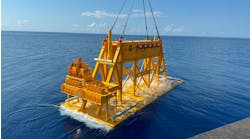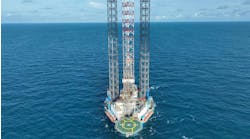Training, processes pave the way
Judy Maksoud
International Editor
With all of the activity taking place off- shore Angola, national oil company Sociedade Nacional de Combustíveis de Angola (Sonangol E.P.) is laying a solid foundation for growth.
Exploration and development dollars continue to pour into West Africa, and much of that money is going to Angola. Sonangol is developing its indigenous resources to sustain domestic development so as to benefit from the influx of foreign investment.
"Initially, Sonangol and its employees will benefit," Valente Caetano Barros da Silva, corporate manager of quality, health, safety, and environment at Sonangol E.P., says. "Even-tually, society at large will be improved."
Sonangol has been proactive in applying QHSE principles as it grows. The systems and processes that have been put in place are critical to the company's successful expansion.
"Sonangol should be an organization structured through processes," says da Silva.
One way the company has created the necessary processes is through benchmarking with other companies' best practices established in Angola.
Sonangol E.P. signed an agreement in 2001 with Det Norske Veritas, which allowed, among other types of assistance, technical support from other organizations to be channeled through DNV. "This assistance has been very, very beneficial to us," da Silva says. DNV is also providing training for a Sonangol engineer.
Sonangol E.P. designed its HSE management system with DNV and defined how the system would be integrated and managed.
"This created a common understanding of what QHSE means from "definition" through to "application" in our lives," da Silva says.
Benchmarking allowed Sonangol to identify weaknesses, which led to finding ways to improve processes. The exercise resulted in what da Silva describes as, "very intensive training beginning with top management."
According to da Silva, Sonangol E.P. will spend around $3 million over the next three and a half years to develop an integrated QHSE management system through the entire organization.
"QHSE is a culture. It needs commitment and leadership from the top down," da Silva says.
Developing partnerships
When it comes to HSE, there should not be competition with others in the business, da Silva says. "We will work with ChevronTexaco, Total, BP, and ExxonMobil. We see them as a team, not as competitors, in finding solutions to improve HSE issues."
Some of these organizations have almost 100 years of experience, da Silva says. "We have been in the offshore business just over 10 years." As a growing company, Sonangol E.P. looks to the experience of others.
Developing and implementing a complete QHSE management system to manage risk and losses is a huge project, but it is vital for the company. "Sonangol E.P. is preparing itself for the challenges we are going to face in the future," da Silva says.
As a young organization, Sonangol E.P. wants to be able to manage the risks it faces. "We believe through proper risk management, we can produce a way to measure and tackle our losses. Risk assessment is not an exercise through which we intend to cut cost," he says.
Sonangol intends to use risk management processes as a tool to reduce loss, da Silva says.
Making progress
As of 1Q 2004, the company had produced a management system and had instituted a campaign to explain the system to its employees. DNV was also under contract at that time to write a manual in conjunction with Sonangol to define procedures and enforce the systems put in place. A training program had already been established, and was operational as of April.
A full-time 12-person team was tasked with putting the program in place. Each team member represents a component within the Sonangol organization. One subsidiary will be selected as a pilot project. The hope, de Silva says, is that experience gained in the earlier part of the project will be applied to training the next subsidiary.
"As a third world country, we have serious problems with human resources. And that is our most valuable asset," da Silva says.
The health aspect within Sonangol E.P.'s integrated QHSE management system reflects that concern. It is a preventive program for diseases such as malaria and HIV. Another Sonangol E.P. objective is to protect natural resources, including mangroves, endangered species of turtles, and manatees. Educational programs are being developed to meet these project objectives.
The whole Sonangol E.P. organization is in the process of identifying existing processes with the aim of improving them. "Sonangol will be an organization managed within a structure of processes," da Silva says. The company plans to evaluate what exists and work toward improving areas where there are shortcomings.
"Sonangol E.P. is implementing standards in the management system which will be defined by international good practice," da Silva says. But there is no off-the-shelf solution. "It is a very comprehensive system that we are creating," da Silva says. The company will consider common practice within the industry and will develop its own programs based on that understanding.
"We want to be a part of the world," da Silva says.
Assisting local companies
A critical element of being part of the world is bringing Angolan companies up to international standards so they can compete for work. Sonangol E.P. is working with local companies to increase their understanding of this need so that lessons learned will remain in the community.
Sonangol E.P. has chosen two local companies and has helped them to find experienced partners from whom they can learn. "The whole community can gain from this," da Silva says. Sonangol E.P. also plans to work with non-governmental organizations on environmental issues in recognizing and accepting their social responsibilities.
"Sonangol E.P. is seen by Angolan society as the leader for the country's development," da Silva says. The company takes that role seriously. Sonangol's goal is to give Angolans a vested interest and stronger role in their country's future.
"We have to be careful that we do not jeopardize the trust and responsibility the population has entrusted to Sonangol E.P. as a company," da Silva says.
Exploration and production
While Sonangol is working to create an environment for growth, Sonangol Pesquisa & Produção, the exploration and production arm of Sonangol, is expanding its role in E&P in the region.
The challenge, according to Gaspar Martins, chairman of the board of Sonangol P&P, is managing a successful operatorship without significant deepwater experience.
"We want to be a stronger player in West Africa, particularly in Angola," Martins says.
"At this stage, we are reorganizing our company to achieve that," he says.
The company has focused on Angola's offshore, but is trying to work abroad as well, "just to get the taste of offshore activity outside Angola," Martins says.
Exploration poses significant hurdles to a young E&P company. "The first objective is to find the oil," Martins says. Toward that end, the company will drill at least one exploration well per year for the next several years. But that is only the first step.
"Once commercial reserves are found, we plan to move as soon as possible to the development stage," Martins says.
The complexity of putting fields into production is clearly a great challenge. Sonangol P&P is consulting with other companies to get the best technology to move fields into production. "Our company doesn't have this expertise," Martins says.
The company is working with partners that have experience in these areas.
One of the ways Sonangol P&P's finding its way into the international marketplace is to form strategic alliances with national oil companies. Though Sonangol's focus will continue to be Angola, Martins believes the company's future lies in getting involved outside its territorial waters.
One way that has happened is that Sonangol P&P engineers have been introduced to project teams developing offshore fields.
"We want to establish strategic alliances," Martins says. "We want to grow."
Offshore activity
Late last year, Sonangol and BP announced the Marte oil discovery in ultra-deepwater block 31. Marte is the fourth exploration well BP drilled in block 31 and the third successful discovery following Plutão and Saturno, which lie 20-25 km from Marte.
In early August, BP selected Transocean Inc.'s semisubmersible Sedco Express to drill the BP-operated Greater Plutonio field beginning in 2Q 2005. The project to develop six fields will be the first development in Angola's block 18 and the first BP-operated project in Angola. The fields Galio, Cromio, Paladio, Plutonio, Cobalto, and Platina, collectively known as Greater Plutonio, are in water depths of 3,900-4,900 ft.
The Total-operated Jasmim field in block 17 came onstream in early December. Jasmim is one of 15 discoveries announced in block 17 and the second to be brought onstream, following Girassol in December 2001. The field lies in 1,400 m of water 150 km offshore, and its development includes eight subsea wells tied back to the Girassol FPSO 5 km away.
Bringing this field onstream increased output from the Girassol FPSO to more than 230,000 b/d. It also extends plateau production from the area and forms part of Total's strategy for increased output from block 17.
In 3Q 2004, Total began awarding the main contracts to initiate development on the Rosa oil field, also in block 17. Rosa is the second field to be tied back to the Girassol FPSO and is scheduled to come onstream in the first half of 2007, raising and prolonging peak production.
ExxonMobil Corp. subsidiary Esso Exploration Angola (block 15) Ltd. began production on the Xikomba field in early December 2003. Xikomba, the company's first producing field offshore Angola, is the first of several anticipated Exxon-operated developments in the region.
Angola to have the largest offshore training center in West Africa
Sonangol is reinforcing training within the country with companies like Det Norske Veritas. "When we signed our first training agreement with Sonangol in 2001, it became clear that much more had to be done," says Sergio Matos, DNV director for business development. The companies have since worked to ensure that knowledge stays in Angola. Several other companies joined them in a partnership agreement to develop training services.
Emprêsa de Serviços de Sondagens de Angola (ESSA) is a partnership formed by Sonangol, Global Marine International Drilling Corp., and Single Buoy Moorings. It was established to train and qualify local workers and technical staff in safety related activities, primarily for the petroleum sector in Angola.
The agreement covers certification, personnel qualification, and training. ESSA's program already includes 35 courses from the DNV training catalogue.
Until recently, petroleum personnel working offshore Angola had to travel outside the country to receive relevant training for the petroleum industry. Today, they can attend this center, which is in new training facilities at Cacuaco, just outside Luanda.
DNV is involved in training related to quality management systems, risk management, and the use of advanced technology. DNV has benefited from that effort, and the DNV Angola work force today is 80% Angolan.




